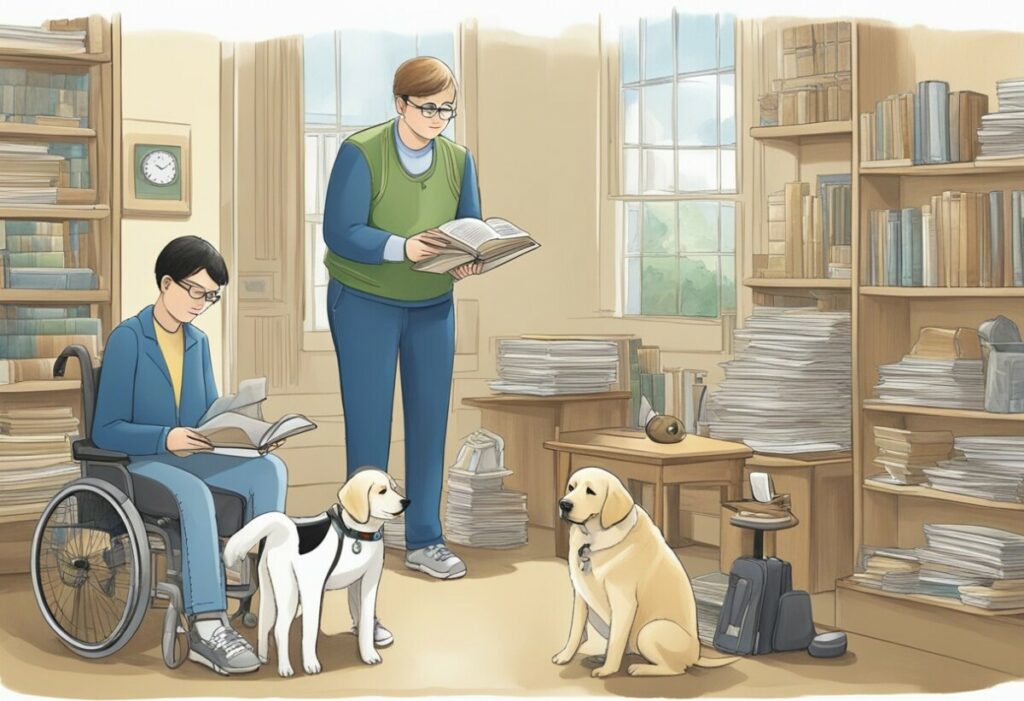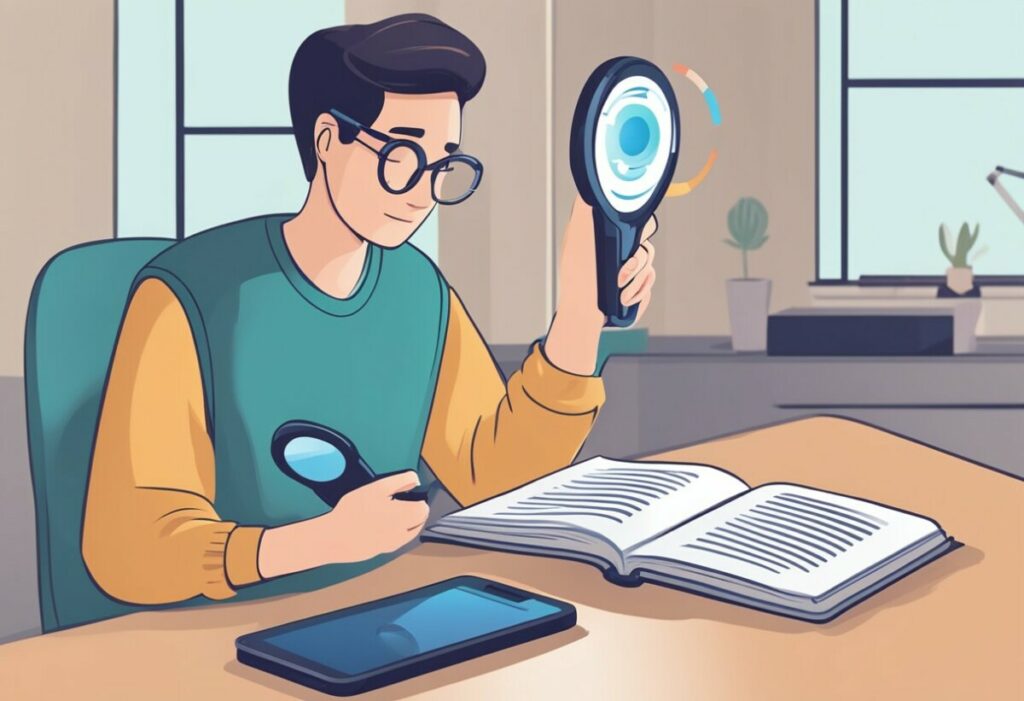Empowering Independence: Strategies for Maintaining Healthy Vision

Understanding Visual Impairment And Strategies for Maintaining Healthy Vision
Maintaining healthy vision with low vision can have a profound effect on an individual’s life, but understanding it is the first step toward empowerment. By learning about the various eye diseases and recognizing the different levels of visual impairment, individuals can better navigate their journey toward maintaining healthy vision and independence.
Eye Diseases and Conditions
Visual impairment often stems from a few common eye diseases:
- Macular Degeneration: This condition primarily affects central vision and is a leading cause of vision loss in people over 60. It occurs when the macula, a part of the retina, deteriorates.
- Glaucoma: Often associated with a buildup of pressure inside the eye, glaucoma can damage the optic nerve, which sends visual signals to the brain.
- Cataracts: Characterized by clouding of the eye’s lens, cataracts can blur vision and diminish the ability to perceive vibrant colors.
- Diabetic Retinopathy: This complication of diabetes can lead to blood vessel damage within the retina, potentially causing blindness.
Protective measures, regular eye exams, and early diagnosis play significant roles in the management of these conditions.
Levels of Visual Impairment
Visual impairment can range from mild to complete blindness:
- Mild Impairment: Individuals may have some difficulty with visual tasks but can often carry out daily activities with minimal aid.
- Moderate to Severe Impairment: This level can significantly affect daily life, necessitating various adaptions or assistive technologies.
- Total Blindness: Defined by a complete lack of light perception, those affected require comprehensive training and tools for navigation and reading.
At New England Low Vision and Blindness, we are committed to providing leading-edge assistive technology and training services, helping you to overcome the challenges posed by visual impairment and ensuring you retain your independence. Our expertise and life-changing resources offer hope and support throughout your journey.
Initial Steps After Diagnosis
When faced with a diagnosis of visual impairment, it’s crucial to take concrete steps to preserve and optimize your remaining vision. These initial efforts are centered around thorough evaluation and understanding of the best possible treatments to maintain independence.
Comprehensive Eye Exam
The cornerstone of eye care after a visual impairment diagnosis is a comprehensive eye exam. This examination, conducted by an eye care professional, such as an optometrist or ophthalmologist, is essential not just for determining the prescription for glasses or contact lenses but also for assessing the overall health of your eyes. During this exam, detailed measurements of visual acuity, refractive errors, and an assessment of any potential eye disease are conducted. It’s the first and most important step in devising a plan to manage your vision health.
Exploring Treatment Options
Once an assessment is made, exploring treatment options with your eye care professional can guide you to the most effective medical treatment strategies. Treatments can range from:
- Medicine: To manage or slow down the progression of certain eye conditions.
- Surgery: Potentially to restore sight or prevent further loss of vision.
- Standard Treatments: These could include corrective lenses or vision therapy.
At New England Low Vision and Blindness, we are dedicated to providing leading-edge assistive technology and training. Our range of devices and resources are designed to empower you to live with greater independence after visual impairment. We bring hope by connecting you to the right tools, ensuring you can lead a full and rewarding life despite the challenges posed by visual impairment.
Vision Rehabilitation Services
In our efforts to support individuals with visual impairments, we understand the importance of vision rehabilitation services. These services are crucial in helping people maintain not only their visual health but also their independence.
Core Components of Vision Rehab
Vision rehabilitation encompasses a wide range of services aimed at assisting those with vision loss. The core components of our vision rehab program include a comprehensive low vision evaluation which assesses the level and impact of vision loss. Following the evaluation, we tailor a set of solutions to address the individual needs of our clients. These often consist of:
- Assistive technology training: Equip clients with leading-edge technologies designed for enhancing their remaining vision.
- Orientation and mobility training: Guidance from orientation and mobility specialists to navigate safely and confidently.
- Life skills: Clients work with occupational therapists to learn new ways to perform daily activities.
- Emotional support: Social workers are available to provide counseling, fostering a network of support for emotional well-being.
Professional Support for Independence
Our team is composed of dedicated professionals, including occupational therapists and social workers, who are here to ensure that each client achieves the highest level of autonomy. Through personalized training and support, clients learn to:
- Optimize their home and work environments for better access and efficiency.
- Implement strategies for managing personal care, cooking, reading, and using technology with a visual impairment.
We at New England Low Vision and Blindness are committed to providing comprehensive low vision care to help our clients live fulfilling lives. Our approach to low vision rehabilitation is grounded in respect for our clients’ abilities and aimed at empowering their independence every step of the way.
Adaptive Tools and Technologies
In our pursuit of supporting individuals with visual impairments, we understand the transformative impact that the right tools and technologies can have on independence and everyday life.
Assistive Devices for Everyday Use
Low Vision Aids: We offer a variety of low vision aids designed to cater to different needs. Handheld magnifiers and stand magnifiers enhance reading material up to your desired level of magnification. These simple yet effective devices can greatly reduce eye strain and improve the clarity of text and images.
For Reading: Large print materials significantly reduce the strain of reading for those with visual impairments by increasing the font size and improving contrast. Alongside these materials, proper lighting is crucial, as it can enhance clarity and reduce glare that can hinder visibility.
High-Tech Solutions for Independence
Advanced Technology: Embracing technology is key to fostering independence. Smart home devices can be voice-controlled, offering hands-free operation and reducing the need to locate physical buttons or controls. This can be particularly empowering for managing home environments.
Communication: Devices equipped with Braille output allow users to read digital text through tactile feedback. Furthermore, specialized telescopes can aid in viewing long distances, such as street signs or public transportation details. Our selection of cutting-edge technology is tailored to fit the unique needs and lifestyle of each individual.
Daily Living Skills and Strategies
When living with visual impairment, mastering daily living skills and developing strategies to navigate the environment is crucial. These skills enhance safety and foster independence, allowing individuals to confidently manage home life and travel.
Home Safety and Organization
To ensure home safety, we recommend creating a consistent and organizational system. This means having a designated place for everything, which can greatly reduce the risk of accidents. For example, use tactile labels or different textures to help distinguish between similar items in the kitchen or medicine cabinet. It’s essential to keep floors clear of obstacles and ensure that all areas are well-lit. Installing accessible features like voice-activated devices and adjustable lighting can greatly improve the home environment. For detailed information on implementing these strategies, you may find the information from Living with Vision Loss: Practical Tips for Safety and Independence quite useful.
Navigating Transportation and Travel
When it comes to traveling, we understand that transportation can be a major hurdle. However, with the right skills and assistance, moving around becomes manageable. Familiarize yourself with the accessibility features of public transit options, and don’t hesitate to ask for assistance when crossing streets or navigating stations. So, develop proficiencies in reading transit schedules in accessible formats and writing down important travel details. Additionally, use specialized navigation apps designed for the visually impaired that give spoken directions and location descriptions. For gaining independence in transportation and travel, paying a visit to the page on What Independent Living Skills Help People Living With Vision Loss? can offer further guidance and tips.
With our expertise in assistive technology and training, New England Low Vision and Blindness can provide tools and resources that bring hope and empowerment, enhancing these essential skills for a richer, more independent life.
Enhancing Quality of Life
Maintaining a high quality of life is crucial for individuals who are visually impaired. We understand the challenges and are committed to providing resources and support that empower independence and enrich personal and professional life.
Social Engagement and Emotional Health
The emotional impact of visual impairment is significant. It can lead to feelings of loneliness and depression if not addressed with appropriate emotional support. We advocate for the importance of social engagement, including joining support groups that connect individuals to others who understand their experiences. Our counseling services can also provide a safe space for expressing emotions and learning strategies to cope with visual impairment.
Participating in activities can vastly improve one’s mood and outlook, helping to reduce feelings of isolation. It’s vital for building consumer confidence and encouraging personal growth. That’s why we emphasize the role of regular social interactions and the establishment of a reliable support network.
Employment and Education Opportunities
Independence is closely tied to the ability to seek and maintain employment. We provide leading-edge assistive technology and training to enhance the skills necessary for our customers to thrive in the workplace. Education is another key area where we focus our resources, enabling access to information and learning through technology designed for those with visual impairments.
Understanding one’s rights and the available accommodations is the first step toward a successful career. We work to raise awareness among employers about the capabilities of visually impaired individuals and strive to help our clients secure meaningful employment.
Access to continuous education opportunities can lead to employment, fostering a sense of purpose and contributing to overall quality of life. Whether it’s through adaptive software, magnification devices, or other assistive tools, we are here to support the academic endeavors of our clients every step of the way.
Free Low Vision Guide
Be sure to download our free Low Vision Guide to help you or a loved one adapt to a world of vision loss https://nelowvision.com/macular-degeneration-help-resources/







